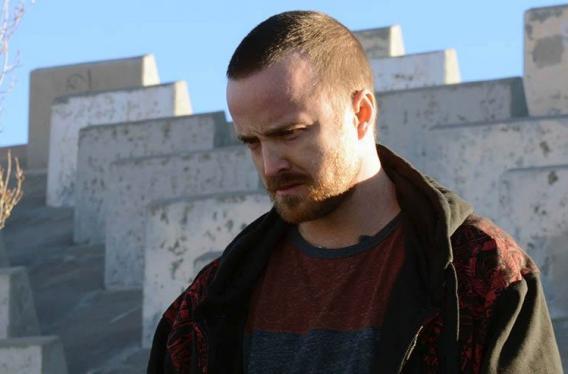In the pilot episode of Breaking Bad, Jesse Pinkman is sprinting away from the fearsome drug dealers Emilio and Krazy 8 when he trips and falls eye-socket-first onto a rock in the New Mexico desert. When he wakes up, he’ll have a scone-shaped shiner the color of a Marie Schrader accent wall. But for the moment, he’s out cold, and Emilio can’t resist kicking him—hard, spitefully, once in the side—when he’s down.
As goes Emilio, so goes Breaking Bad. This show has never passed up an opportunity to kick Jesse Pinkman when he’s down. It’s forever endeavoring to find new, more vigorous techniques for kicking him when he’s down—through pirouettes of plot and calisthenics of character development—and new, pliant body regions to kick or, when the kicking is done, punch or stomp or split open bleeding. What horrible thing hasn’t happened to Jesse, perhaps repeatedly, over the last five seasons? Psycho Tuco beat him bad enough to put him in the hospital. Psycho Hank beat him bad enough to put him in the hospital again. He awoke one morning to find his beloved Jane dead beside him. He feels responsible for the deaths of Jane and Combo and Tomás. He is responsible for the death of Gale, although Walter was the one really pulling the strings. He’s been rejected by his biological family, and lost his adopted one—Andrea and Brock—around the time that Walter decided the best plan of action for preserving his meth empire was to poison a small child and later plant a ricin cigarette in Jesse’s Roomba, just to reinforce one more time (but not one last time) what a stupid worthless junkie imbecile Jesse is, because that’s always been Walter’s favorite topic of discussion—his go-to when the cocktail chatter is flagging.
However difficult this may be to watch, Jesse’s ongoing abasement served a narrative purpose. Jesse evolved from bratty burnout to, for a time, the show’s most complex and interesting character—a “bad” kid who increasingly, desperately wanted to be good, without knowing that in the pitiless Breaking Bad universe, no good deed goes unpunished. (Admittedly, most bad deeds don’t go unpunished on Breaking Bad, either. It’s a punitive show.) You could judge the progress of Walter’s moral corrosion at any given moment by measuring how hollowed out Jesse was, how pulped and zombiefied. Jesse suffered for Walter’s sins, so the viewer could only hope that Walter’s sins would finally catch up with him.
But as of last week’s episode, the third-to-last in the entire series, I’m hoping that The Passion of the Jesse has completed its stations of the cross, and that no Christlike martyrdom is in store for a character who tried so hard to redeem himself. “Ozymandias” was an astonishing piece of television, and it feels churlish to quibble with it. And I’d never suggest that Gilligan and his amazing writing staff have somehow lost track of how many subdural hematomas and PTSD triggers they’ve bestowed on Jesse—this is a character so relentlessly (and self-consciously) dehumanized that they recently honored him with the eponymous episode title “Rabid Dog.” That said, burying Jesse under this gruesome stack of physical and psychological torments—Walter’s taunts about Jane’s death, disfiguring torture, and a possible eternity as a meth-lab slave—is starting to feel less like Vince Gilligan and more like Mel Gibson doing a drug-addiction PSA for the producers of Saw. The phrase “torture porn” got thrown about too much among film critics of the mid-2000s, but Jesse’s terrified screams in the white-supremacist chamber of horrors and the clank-and-rattle of his halting steps in the lab are the soundtrack of a pornography of suffering. Walter’s crutch is to abuse Jesse whenever he needs a mini-exorcism; increasingly, his crutch has become the show’s. The plot is such a perfect machine, exquisitely calibrated and fast as light—so why does Jesse have to be ground up in its engine blades?
There has been some hypothesizing online—speculative spoiler alert—that Walter will return to Albuquerque in the final movements of Breaking Bad to save Jesse from the Nazi meth squad. That seems eminently possible to me, but maybe only half-satisfying. I’m all for a happy ending for poor Jesse. I want Jesse and Brock riding Go-Karts through a field of flowers, Andrea behind them astride a unicorn, heading home beneath a rainbow to an Xbox in every room, a Georgia O’Keefe door on every surface, and a counselor trained in prolonged-exposure therapy available on every alternating weekday. But I don’t want it to come at the behest of Walter White. Because then it’s a poisoned gift—the show has already told us that we can only despair of his works.
